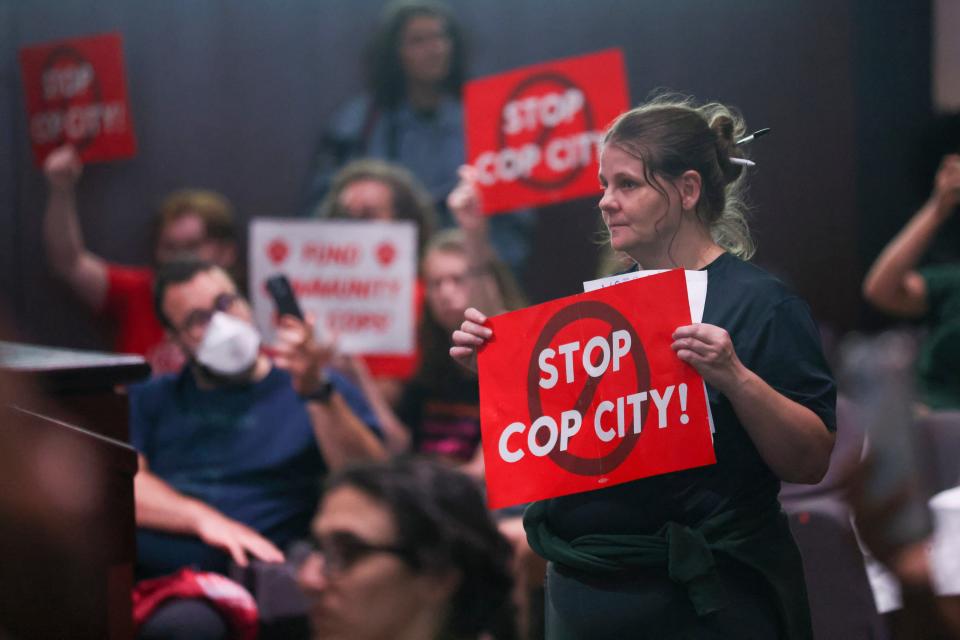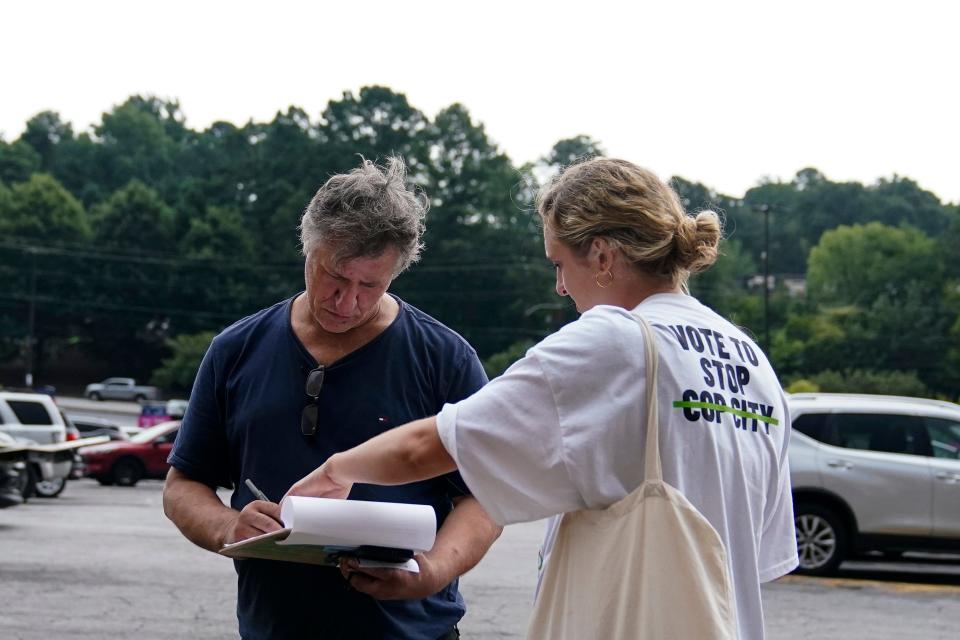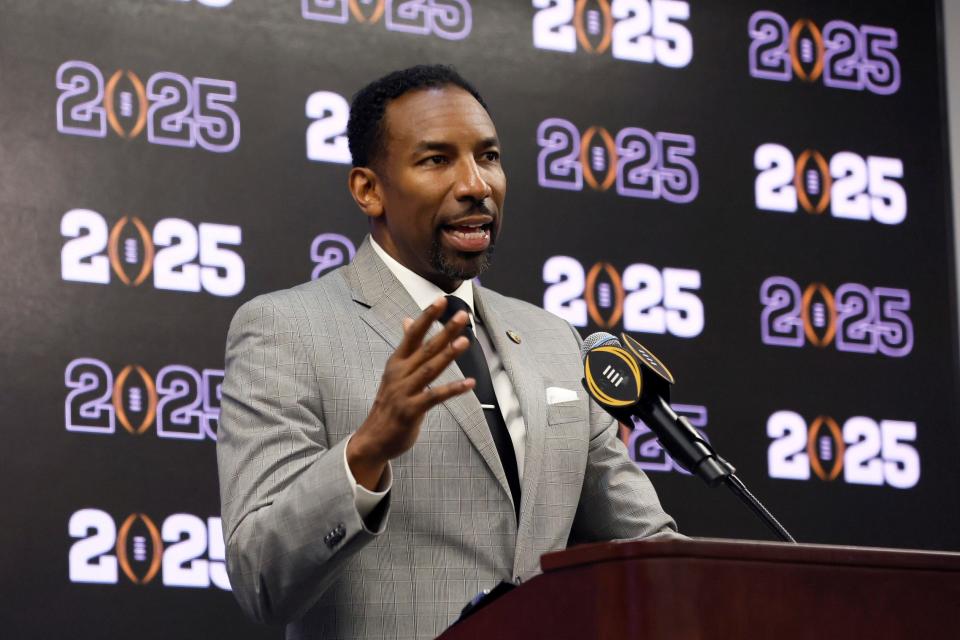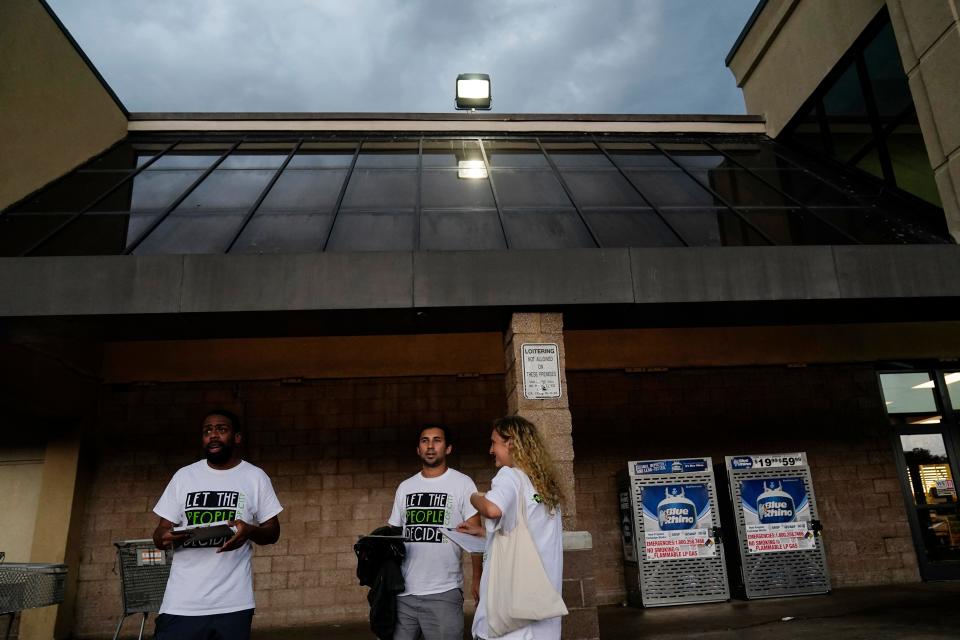Can Atlanta voters stop 'Cop City'? Why a vote could be 'transformative' for democracy
When Mary Hooks arrived at Atlanta City Hall Monday, spirits were high after a sweltering summer spent collecting tens of thousands of signatures to force a referendum vote on a controversial police and firefighter training facility.
Activists who oppose the construction of the $90 million, 85-acre training center near Atlanta, dubbed "Cop City" by its opponents, lined up along stairways and through hallways, passing boxes of paperwork to the clerk's office.
But the moment of triumph quickly turned into a standoff when city officials told organizers they couldn't begin the process of verifying the signatures on the petition. What's more, they've said, referendums can't be used to overturn this kind of city ordinance, so the entire process is moot.
The showdown between Cop City critics and city government is fueling a larger debate over whether Georgia voters have the right to overturn some city ordinances.
An attorney for the city said a recent court order means organizers missed the deadline to turn in the petition, but even if it was turned in on time, a referendum can't repeal the city ordinance that authorized the project's lease. Proponents of the referendum disagree. Fred Smith, a law professor at Emory University in Atlanta, said if they are successful they will set a precedent allowing city voters to overturn government policy through the power of the ballot.
Smith said an appellate court must first decide if the petition can be accepted. If that happens, he said the state's high court may eventually have to determine whether a referendum can repeal this city ordinance. He said the Georgia Supreme Court has signaled it will likely side with the petitioners, which would grant voters in Atlanta and cities across Georgia more power to challenge their local governments.
"If this is allowed to go forward, it will mean that when (city councils and county commissions) pass deeply unpopular legislation, that voters can be a direct check on that," he said. "And that's a trend that will be a transformative moment in the history of Georgia democracy."
What is Atlanta's Cop City?
Hooks, national field secretary for a coalition of activist organizations known as the Movement for Black Lives, said the resistance from city officials is disappointing, but not unexpected.
"There are many battles ahead of us because they are clear that they want to use the courts, the crooked courts, to try to dissuade people from having a voice in it," Hooks said.

In September 2021, the Atlanta City Council agreed to lease land for the facility to the private Atlanta Police Foundation for $10 a year.
Earlier this year, opponents of the project began collecting signatures from Atlanta residents to get a referendum on the November ballot that would allow voters to weigh in on whether they want to repeal the ordinance that authorized that lease.
Activists needed more than 58,00 signatures - the equivalent of 15% of registered voters as of the last city election - to get a referendum on the ballot, according to the clerk's office. Activists said they turned in more than 116,000 signatures to the city Monday.
Last month, the city unveiled its plan to verify that all of the signatures on the petition belong to an Atlanta resident who registered to vote during the 2021 municipal elections. Reviewers will then compare the signature to available public records, a tactic that voting rights advocates have called a "discredited tool of voter suppression."
According to the City Clerk's office, this is the first petition process the city has conducted and the policies and procedures around it were developed based on existing Georgia law and best practices from around the country.

What do city officials say about the referendum?
Atlanta Mayor Andre Dickens said at a July 5 news conference that no one in law enforcement or his administration would interfere with the petition process. He said the citizens of Atlanta support the training center and the attempt to collect the signatures needed to secure the referendum would be “unsuccessful if it’s done honestly.” Dickens statement came about a month after a 14-hour City Council meeting during which hundreds of people spoke out in opposition to the project.
Two weeks later, attorneys for the city called the entire effort “futile” and “invalid" in court filings. Robert Ashe, the city's outside council, told USA TODAY a Georgia Supreme Court case from the 1990s established that the petition process can't be used to repeal city ordinances unless they involve a change to the city's charter, which the ordinance related to the training facility does not. Ashe also said that repealing the ordinance that allowed the lease to be approved would not undo the lease itself because both the federal and state constitutions prohibit legislative bodies such as the City Council from canceling contracts retroactively.

Can the petition and referendum actually stop Cop City?
On Monday, Ashe announced yet another issue: the city cannot begin the process of verifying the signatures because activists turned them in late.
The organizers were initially required to turn in the signatures by Aug. 21, but in July, a judge for the United States District Court for the Northern District of Georgia, Mark Cohen, extended that deadline until late September. Ashe said the city appealed and on Sept. 1, the 11th Circuit Court of Appeals issued an order pausing the enforcement of the district court ruling pending the outcome of the appeal. Ashe said that order means the city cannot begin verifying the petition because it was turned in after the original deadline set by state law.
Kurt Kastorf, an attorney for the coalition, told reporters Monday the city’s claim that it can’t begin the verification process is insincere and incorrect. Lawyers for the coalition asked the district court to intervene and allow the process to begin.
But on Wednesday, Cohen, the district court judge, ruled that he cannot force the city to begin processing the signatures. Cohen accused the city of taking "vacillating positions throughout this legislation" and directly contributing to the confusion.
"It has consistently been the City's legal opinion that Georgia law does not allow for a referendum, but the City still issued the petition in a gesture of goodwill and good faith," the city said in a statement.
Now, "the ball is in the court of the 11th Circuit," Smith said. He said there is a wide range of actions that the appellate court could take and the temporary stay makes unclear what the fate of the signatures will be.
"Anyone who tells you that they know exactly what that means legally in this moment, I would be quite skeptical because I talked to a fair number of people about this and I teach federal courts, that's what I study, and I don't know what a stay means in this particular context," he said.

Smith said ultimately if the signatures are able to be verified, the petition process can succeed, though the question may work its way up to the Georgia Supreme Court.
In February, the state's high court unanimously rejected an attempt by commissioners in Camden County to invalidate a referendum in which residents voted overwhelmingly to stop county officials from building a launchpad for commercial rockets. Smith said it would be "politically untenable" for Camden County officials to reinstate the project after that decision.
Although the February decision involved a county and not a city, Smith said it sends strong signals that voters at the city level have the same power. He said the Atlanta case will be "precedent-setting."
"I think on that score, under state law, this will likely prove to be a permissible process," he said. "And again, a game changer for democracy in the state."
Contributing: The Associated Press
This article originally appeared on USA TODAY: Thousands in Atlanta want to vote on 'Cop City.' Can they stop it?

